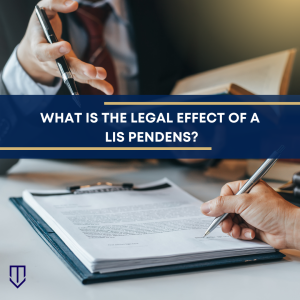 Lawsuits that affect interests in real property, such as partition actions, often require courts to adjudicate competing claims regarding who should have title to or possession of real property. In general, courts adjudicating such disputes follow the principle of “first in time, first in right.” Under this principle, “a conveyance recorded first generally has priority over any later-recorded conveyance.” (First Bank v. East West Bank (2011) 199 Cal.App.4th 1309, 1313.)
Lawsuits that affect interests in real property, such as partition actions, often require courts to adjudicate competing claims regarding who should have title to or possession of real property. In general, courts adjudicating such disputes follow the principle of “first in time, first in right.” Under this principle, “a conveyance recorded first generally has priority over any later-recorded conveyance.” (First Bank v. East West Bank (2011) 199 Cal.App.4th 1309, 1313.)
An important factor that courts consider when adjudicating cases affecting interests in property is whether each party affected by the court’s judgment had notice of the litigation or judgment. A judgment affecting title to or possession of real property that is recorded imparts “constructive” notice to a subsequent transferee or encumbrancer. When recorded, such judgment is effective against any subsequent conveyance or encumbrance, regardless of whether the parties to that judgment receive notice about the subsequent conveyance or encumbrance. (Civ. Code, § 1214.)
In contrast, a judgment that is not recorded with the recorder’s office of the county in which a property is located does not impart constructive notice to subsequent transferees or encumbrancers of the property. Any such judgment generally is not binding on a subsequent transferee or encumbrancer who acquires and records an interest in the property without notice of the prior litigation or judgment. (Civ. Code, § 1214.)
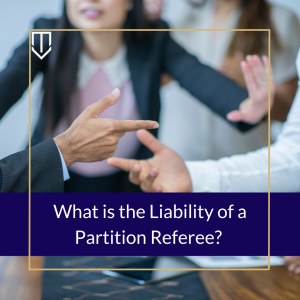 Generally, when a trial court orders an interlocutory judgment directing a partition by sale, it can appoint a referee to conduct the sale (CCP § 873.010). However, when a party to the partition feels that they have been aggrieved by the actions of this court-appointed referee, they may bring an action against them.
Generally, when a trial court orders an interlocutory judgment directing a partition by sale, it can appoint a referee to conduct the sale (CCP § 873.010). However, when a party to the partition feels that they have been aggrieved by the actions of this court-appointed referee, they may bring an action against them. California Partition Law Blog
California Partition Law Blog


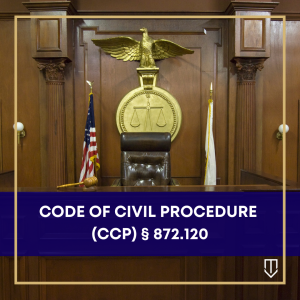 California Code of Civil Procedure section 872.130 expands the court’s authority in an effort to make the court system more efficient when ordering a
California Code of Civil Procedure section 872.130 expands the court’s authority in an effort to make the court system more efficient when ordering a 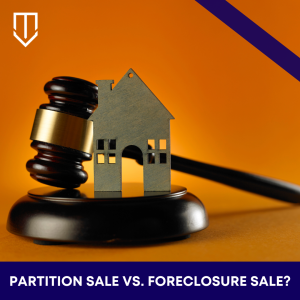 Partitions sales and foreclosure sales are two different ways that a property can be sold. The main difference between the two is the purpose behind the two sales. For partition sales, the purpose is to divide the property and for the owners to get the proceeds in proportion to their ownership. The purpose of foreclosure sales is to pay off a borrower’s loan.
Partitions sales and foreclosure sales are two different ways that a property can be sold. The main difference between the two is the purpose behind the two sales. For partition sales, the purpose is to divide the property and for the owners to get the proceeds in proportion to their ownership. The purpose of foreclosure sales is to pay off a borrower’s loan. 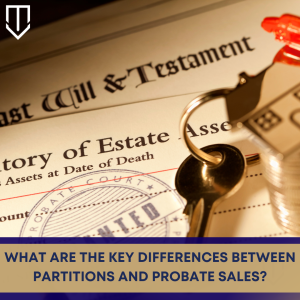 Partitions sales and probate sales are two different ways that a property can be sold. A main difference between the two is that a partition sale is ordered and overseen by the court, while a probate sale is generally overseen by a personal representative, and the court can have minimal involvement. There are also specific steps that the personal representative must take in the probate sale process under California law.
Partitions sales and probate sales are two different ways that a property can be sold. A main difference between the two is that a partition sale is ordered and overseen by the court, while a probate sale is generally overseen by a personal representative, and the court can have minimal involvement. There are also specific steps that the personal representative must take in the probate sale process under California law. 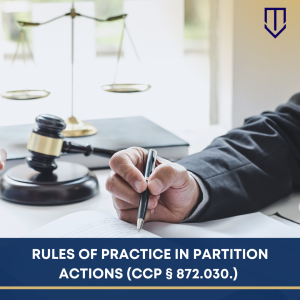 The California Code of Civil Procedure plays a pivotal role in shaping the legal landscape of civil actions. The
The California Code of Civil Procedure plays a pivotal role in shaping the legal landscape of civil actions. The 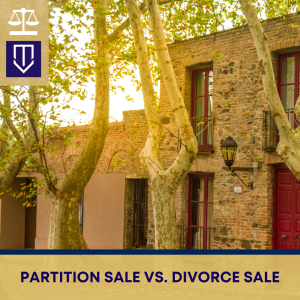 Partitions sales and divorce sales are two different ways that a property can be sold. One difference between the two is that in a partition sale, the court usually decides the proportion of ownership and how the proceeds are distributed among the owners, while in a divorce sale, the court generally must divide the property equally. Another difference is that the divorce sale process is similar to a normal real estate sale. Both sales can be determined informally among the parties or ordered by a court.
Partitions sales and divorce sales are two different ways that a property can be sold. One difference between the two is that in a partition sale, the court usually decides the proportion of ownership and how the proceeds are distributed among the owners, while in a divorce sale, the court generally must divide the property equally. Another difference is that the divorce sale process is similar to a normal real estate sale. Both sales can be determined informally among the parties or ordered by a court.  Partitions sales and trustee sales are two different ways that a property can be sold. A main difference between the two is that a partition sale is ordered and overseen by the court, while a trustee sale is overseen by a third party in relation to foreclosure proceedings. While the third party is not beholden to a court ruling in a trustee sale, they must still follow the procedures outlined in California law.
Partitions sales and trustee sales are two different ways that a property can be sold. A main difference between the two is that a partition sale is ordered and overseen by the court, while a trustee sale is overseen by a third party in relation to foreclosure proceedings. While the third party is not beholden to a court ruling in a trustee sale, they must still follow the procedures outlined in California law. Lawsuits that affect interests in real property, such as partition actions, often require courts to adjudicate competing claims regarding who should have title to or possession of real property. In general, courts adjudicating such disputes follow the principle of “first in time, first in right.” Under this principle, “a conveyance recorded first generally has priority over any later-recorded conveyance.” (
Lawsuits that affect interests in real property, such as partition actions, often require courts to adjudicate competing claims regarding who should have title to or possession of real property. In general, courts adjudicating such disputes follow the principle of “first in time, first in right.” Under this principle, “a conveyance recorded first generally has priority over any later-recorded conveyance.” (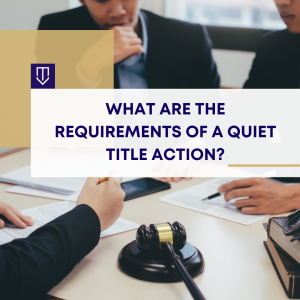
 Yes, although the tenant is not allowed to exclude the non-consenting owners. The reason for this is grounded in ancient legal doctrine regarding the “right to possession” that all co-owners of property share together. Each owner may exercise this right, and each may grant it to a third party, should they so choose, even without the consent of the other owners.
Yes, although the tenant is not allowed to exclude the non-consenting owners. The reason for this is grounded in ancient legal doctrine regarding the “right to possession” that all co-owners of property share together. Each owner may exercise this right, and each may grant it to a third party, should they so choose, even without the consent of the other owners.